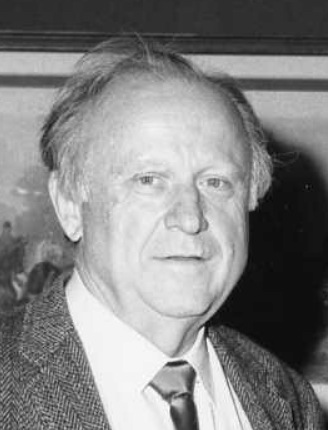Frank Herbert nejznámější citáty
Frank Herbert citáty a výroky
Originál: (en) Technology is both a tool for helping humans and for destroying them. This is the paradox of our times which we're compelled to face.
Zdroj: "Conversations in Port Townsend," interview with Tim O'Reilly, 1983. Reprinted in The Maker of Dune: Insights of a Master of Science Fiction (1987), edited by Tim O'Reilly. (angličtina)
Frank Herbert: Citáty anglicky
“There is only one true wealth in all the universe--living time.”
The Green Brain (1966)
Kontext: There is only one true wealth in all the universe. I have given you some of it. I have given your father and your mate some of it. And your friends. This wealth is living time. Time.
Kontext: "A slave is one who must produce wealth for another," the Brain said. "There is only one true wealth in all the universe. I have given you some of it. I have given your father and your mate some of it. And your friends. This wealth is living time. Time. Are we slaves because we have given you more time to live?"
Dune Genesis (1980)
Kontext: In the beginning I was just as ready as anyone to fall into step, to seek out the guilty and to punish the sinners, even to become a leader. Nothing, I felt, would give me more gratification than riding the steed of yellow journalism into crusade, doing the book that would right the old wrongs.
Reevaluation raised haunting questions. I now believe that evolution, or deevolution, never ends short of death, that no society has ever achieved an absolute pinnacle, that all humans are not created equal. In fact, I believe attempts to create some abstract equalization create a morass of injustices that rebound on the equalizers. Equal justice and equal opportunity are ideals we should seek, but we should recognize that humans administer the ideals and that humans do not have equal ability.
Dune Genesis (1980)
Kontext: Reevaluation taught me caution. I approached the problem with trepidation. Certainly, by the loosest of our standards there were plenty of visible targets, a plethora of blind fanaticism and guilty opportunism at which to aim painful barbs.
But how did we get this way? What makes a Nixon? What part do the meek play in creating the powerful? If a leader cannot admit mistakes, these mistakes will be hidden. Who says our leaders must be perfect? Where do they learn this?
Dune Genesis (1980)
Kontext: No matter how finely you subdivide time and space, each tiny division contains infinity.
But this could imply that you can cut across linear time, open it like a ripe fruit, and see consequential connections. You could be prescient, predict accurately. Predestination and paradox once more.
The flaw must lie in our methods of description, in languages, in social networks of meaning, in moral structures, and in philosophies and religions — all of which convey implicit limits where no limits exist. Paul Muad'Dib, after all, says this time after time throughout Dune.
“The thing we must do intensely is be human together. People are more important than things.”
"Introduction" to New World or No World (1970)<!-- an anthology of environmental writing -->
General sources
Kontext: The thing we must do intensely is be human together. People are more important than things. We must get together. The best thing humans can have going for them is each other. We have each other. We must reject everything which humiliates us. Humans are not objects of consumption. We must develop an absolute priority of humans ahead of profit — any humans ahead of any profit. Then we will survive. … Together.
General sources
Kontext: The thing we must do intensely is be human together. People are more important than things. We must get together. The best thing humans can have going for them is each other. We have each other. We must reject everything which humiliates us. Humans are not objects of consumption. We must develop an absolute priority of humans ahead of profit — any humans ahead of any profit. Then we will survive. … Together.
"Introduction" to New World or No World (1970)<!-- an anthology of environmental writing -->
"Science Fiction and a World in Crisis" in Science Fiction: Today and Tomorrow (1974) edited by Reginald Bretnor
General sources
Kontext: The current utopian ideal being touted by people as politically diverse (on the surface, but not underneath) as President Richard M. Nixon and Senator Edward M. Kennedy goes as follows — no deeds of passion allowed, no geniuses, no criminals, no imaginative creators of the new. Satisfaction may be gained only in carefully limited social interactions, in living off the great works of the past. There must be limits to any excitement. Drug yourself into a placid "norm." Moderation is the key word…
“Don't condemn people who need it. Be very careful when that need becomes fanatical.”
"Conversations in Port Townsend", interview with Tim O'Reilly, 1983. Reprinted in The Maker of Dune: Insights of a Master of Science Fiction (1987), edited by Tim O'Reilly
General sources
Kontext: What I'm saying in my books boils down to this: Mine religion for what is good and avoid what is deleterious. Don't condemn people who need it. Be very careful when that need becomes fanatical.
“Truth suffers from too much analysis.
-Ancient Fremen Saying”
Zdroj: Dune Messiah
Princess Irulan in The Humanity of Muad'Dib
Dune (1965)
Kontext: Muad'Dib learned rapidly because his first training was in how to learn. And the first lesson of all was the basic trust that he could learn. It's shocking to find how many people do not believe they can learn, and how many more believe learning to be difficult. Muad'Dib knew that every experience carries its lesson.
